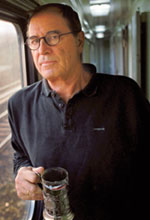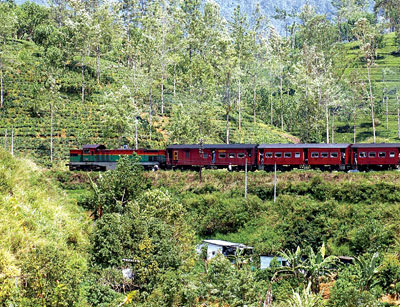Ghost Train to the Eastern Star
Veteran travel writer finds paradise in Sri Lanka:
|

Paul Theroux
|
Grouchy armchair travellers, rejoice: Paul Theroux has written
another travel book. And he’s as cranky as ever. Theroux first wrote
about Eurasian rail travel 33 years ago in
“The Great Railway Bazaar,” a classic of the genre. He recently hit
the rails again for an update. As he demonstrates in his new, bleakly
funny and affecting account, “Ghost Train to the Eastern Star: On the
Tracks of the Great Railway Bazaar,” he wasn’t unduly impressed this
time, either.
Theroux finds a few places quite fetching, though, and even discovers
one where he could settle down permanently. “Except for a flicker of
temptation in Sri Lanka, I had never had a serious thought of this
anywhere else so far,” he writes. “But in the north of Thailand, I
entertained the notion of simply dropping out of the world and fitting
myself into this version of pastoral, walking up and down in my pijama
bottoms.”
If Theroux likes it, it must be paradise.
On the veranda of a guesthouse in Sri Lanka, he records “the muted
buzz of the small seaside town at night, the soft air, the perfume of
the blossoms. No event, no drama, just contentment, as though I had set
off from London and travelled for months to be here.”
Such interludes arrive most often not when he is at rest, but when he
is alone and in motion, as in a gently rocking car on the Trans-Siberian
Railroad Bucharest, he writes, is “a city of sullen, desperate vice.”
Turkmenistan has “a landscape like kitty litter.”
The outskirts of Bukhara in Uzbekistan, Theroux writes, look
“seedier, poorer, dirtier, grubbier, more tumbledown than Turkmenabat,
just over the border, which was merely ugly and strange. “And Georgia?”
supine and beleaguered country of people narcissistic about their
differences.”
Fans of Theroux’s travel writing shouldn’t be surprised by his
critical assessments; the word “dyspeptic” comes to mind when assessing
Theroux’s reaction to his travel subjects. He travels, so you don’t have
to.
The world, experts tell us, has changed since “The Great Railway
Bazaar” appeared. The end of the Cold War opened new markets and led to
the rise of today’s global economy, with China and India playing
increasingly powerful roles on the world stage.
Theroux remains unconvinced that the wealth generated by those
emerging markets will trickle down to impoverished individuals who
resist the urge to emigrate — or don’t earn enough for airfare. And he’s
especially sceptical about India’s economic “miracle.”
“No one succeeds in India without exploiting someone else, defrauding
him, sitting on his head, twisting his arm, getting him to work for 12
cents an hour,” Theroux writes. “The news is all about the winners — big
business, call canters, manufacturing, textiles, all the rest of it. But
for there to be big winners in India, there have to be bigger losers. It
is the system.”
Theroux says in the opening chapter of “Ghost Train to the Eastern
Star” that writing about travel is the nearest he will come to
autobiography. He certainly offers glimpses of his life — a failed
marriage, years without money, a stint as a teacher in Singapore.
But he’s more interested in catching glimpses of himself as a
younger, more naive traveller wandering through the same region half a
lifetime ago.
|

An alluring train ride in Sri Lanka |
The classic book that Paul Theroux wrote after travelling by train
through Asia was no golden-hued chronicle of stunning sights seen,
gourmet meals eaten, fine art and architecture appreciated. His
remarkable “The Great Railway Bazaar,” published in 1975, was acerbic,
crabbed, black-humoured — more H. L. Mencken than Rick Steeves. Now we
know why. Theroux’s then-wife had strongly objected to his taking that
trip, and he returned to find that she had taken a lover. Theroux admits
he could not truly fault her, because he had not been faithful to her.
But his pain and loss leached into the book he wrote on his return. In
the opening of “Ghost Train to the Eastern Star,” his new book retracing
the old route, he recalls that pain: “Instead of killing anyone, or
threatening it anymore, I sat in my room and wrote in a fury, abusing my
typewriter, trying to lose myself in the book’s humour and strangeness.
I had a low opinion of most travel books. I wanted to put in
everything that I found lacking in the other books — dialogue,
characters, discomfort — and to leave out museums, churches, and
sightseeing generally.
Though it would have added a dimension, I concealed everything about
my domestic turmoil. I made the book jolly, and like many jolly books it
was written in an agony of suffering, with the regret that in taking the
trip I had lost what I valued most: my children, my wife, my happy
household.”
The new book still doesn’t sound like Rick Steeves — Theroux’s
accustomed acerbity and black humour are here — but so are good humour
and a new capacity for enjoyment. Theroux is now 65 and the effect is
welcome. “Ghost Train” has a more open, expansive feel than its
predecessor; it does not read like it was written by a man in despair.
Once again, Theroux journeys from London to Paris to Istanbul along
the route of the now-defunct Orient Express, then follows the rails to
the Caucasus and Central Asia, across India to Sri Lanka, through
Myanmar and all of Southeast Asia, a bit of China and much of Japan; and
westward via the Trans-Siberian Railroad back to Europe. The route is
not identical to the previous trip — Iran was open to travel then and
isn’t now; China wasn’t then and now is — but it’s close enough to mine
comparisons.
Theroux the observer is withering on the egomaniacal dictator of
Turkmenistan, “one of the wealthiest and most powerful lunatics on
earth.”
The writer is apprehensive about the “colossal agglomeration of
elbowing and contending Indians,” that their “unending experience of
nonconsensual rubbing” portends all our futures in a teeming world. He
is appalled at seeing Singaporeans “infantilised and overprotected by
their unstoppably manipulative government” and he is moved by the
willingness of the Vietnamese “to forgive, or move on, when the subject
of the war came up.” In Japan, Theroux foresees a “Nipponised future”
for an overcrowded world: “an almost robotic obedience, decorum,
rigidity, order with no frills, a scaling down of space, agreed-upon
courtesies (high-density living requires politeness), the virtual
abolition of private cars, an intimidating police presence, and no
arm-swinging.” Yet there are moments when Theroux cannot help but enjoy
himself.
“I could not have been more content, sitting in this privacy,
watching the cooling gold light from the sinking sun redden the snow and
the birch bark, making the world seem so far away. I was released from
all concerns, floating across the snowfields.” Such moments are rare, in
Theroux, and all the more welcome. Dubail is The Plain Dealer’s
assistant managing editor for online.
Cleveland.com/Richmond Times
|

